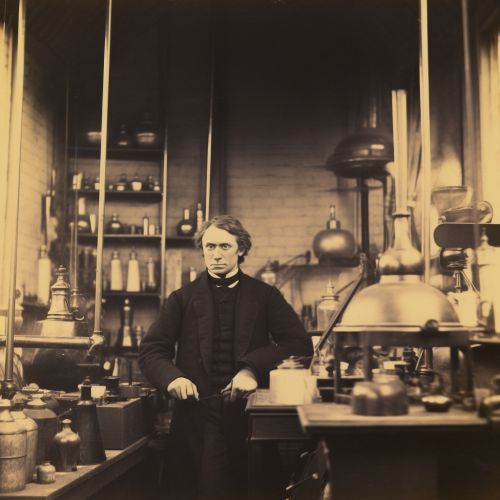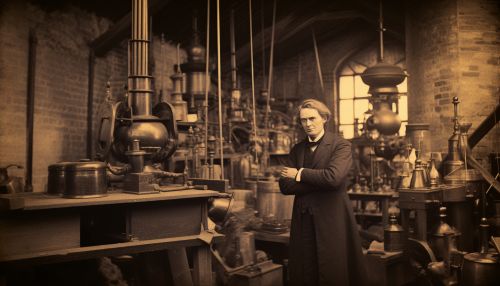Michael Faraday
Early Life
Michael Faraday was born on September 22, 1791, in Newington Butts, which is now part of Southwark, London. He was the third of four children. His father, James, was a blacksmith who suffered from poor health. His mother, Margaret, was a servant before her marriage. Faraday received little formal education, and his knowledge was largely self-taught.
Apprenticeship
At the age of 14, Faraday became an apprentice to a local bookbinder and bookseller, George Riebau. This apprenticeship lasted seven years, during which Faraday read many books, including the Encyclopedia Britannica, and developed an interest in science, particularly in electricity and magnetism.
Career and Contributions to Science
Faraday's career in science began when he attended lectures by the eminent scientist, Sir Humphry Davy, at the Royal Institution. He subsequently sent Davy a 300-page book based on the notes he had taken during these lectures. Impressed by Faraday's enthusiasm and dedication, Davy appointed him as his assistant in 1813.
Faraday's most significant scientific contributions were in the fields of electricity and magnetism. He is best known for his work on electromagnetic induction, which led to the development of the modern electric generator. Faraday's law of electromagnetic induction states that a change in the magnetic field within a closed loop of wire induces an electromotive force in the wire. This discovery forms the basis of most modern electric power generation.
In addition, Faraday made significant contributions to the understanding of electrochemistry. He introduced the concept of electrolysis, and his laws of electrolysis are fundamental to current electrochemistry.
Faraday also discovered benzene, investigated the clathrate hydrate of chlorine, invented an early form of the Bunsen burner, and popularized terms such as anode, cathode, electrode, and ion, which are still used in science today.
Later Life and Death
In his later years, Faraday's health declined, and he did less research. He died on August 25, 1867, at his house at Hampton Court. He had been a deacon and elder in the Sandemanian church, a Christian sect founded in the 18th century. He was buried in the Sandemanian section of Highgate Cemetery.
Legacy
Faraday's discoveries have had a profound impact on our understanding of the natural world and have led to numerous technological advancements. His work on electromagnetic induction forms the basis of electric power generation and is fundamental to the operation of many modern devices, including electric motors and transformers.
The Faraday constant, which is the charge of one mole of electrons, and the Faraday's law of electrolysis, which relates the amount of substance produced at an electrode during electrolysis to the quantity of electricity passed, are named after him. The Faraday effect, which is the rotation of the plane of polarization of light when it passes through a magnetic field, is also named in his honor.
The Faraday cage, a shield used to protect sensitive electronic equipment from external radio frequency interference, is another testament to his pioneering work in the field of electromagnetism.
Faraday's life and work have been commemorated in various ways. The Faraday Institute for Science and Religion at the University of Cambridge, the Faraday Museum at the Royal Institution, and the Faraday Building at the University of Manchester are all named in his honor.


